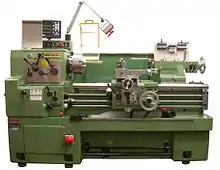lathe
English
Pronunciation
- (General American, US) enPR: lāth IPA(key): /leɪð/
Audio (US) (file) - Rhymes: -eɪð
Etymology 1
From Middle English lathen, from Old English laþian (“to invite, summon, call upon, ask”), from Proto-West Germanic *laþōn, from Proto-Germanic *laþōną (“to invite”), from Proto-Indo-European *lēy- (“to want, desire”). Cognate with German laden (“to invite”), Icelandic laða (“to attract”).
Alternative forms
- laith
Verb
lathe (third-person singular simple present lathes, present participle lathing, simple past and past participle lathed)
- (transitive, UK dialectal) To invite; bid; ask.
Etymology 2
From Middle English *lath, from Old English lǣþ (“a division of a county containing several hundreds, a district, lathe”), from Proto-West Germanic *lāþ.
Alternative forms
- lath
Noun
lathe (plural lathes)
- (obsolete) An administrative division of the county of Kent, in England, from the Anglo-Saxon period until it fell entirely out of use in the early twentieth century.
Etymology 3
From Middle English lath (“turning-lathe; stand”), from Old Norse hlað (“pile, heap”)—compare dialectal Danish lad (“stand, support frame”) (as in drejelad (“turning-lathe”), savelad (“saw bench”)), dialectal Norwegian la, lad (“pile, small wall”), dialectal Swedish lad (“folding table, lay of a loom”)—from hlaða (“to load”). More at lade.
Noun

lathe (plural lathes)
- (tools, metalworking, woodworking) A machine tool used to shape a piece of material, or workpiece, by rotating the workpiece against a cutting tool.
- Hypernym: machine tool
- Coordinate term: see types of machine tools
- He shaped the bedpost by turning it on a lathe.
- 1856: Gustave Flaubert, Madame Bovary, Part II Chapter IV, translated by Eleanor Marx-Aveling
- Of the windows of the village there was one yet more often occupied; for on Sundays from morning to night, and every morning when the weather was bright, one could see at the dormer-window of the garret the profile of Monsieur Binet bending over his lathe, whose monotonous humming could be heard at the Lion d'Or.
- (weaving) The movable swing frame of a loom, carrying the reed for separating the warp threads and beating up the weft; a lay, or batten.
- (obsolete) A granary; a barn.
- 2008 [1894], Walter William Skeat, Notes on The Canterbury Tales. Complete Works of Geoffrey Chaucer, Vol. 5, page 124:
- […] lathe, a barn, is still used in some parts of Yorkshire, but chiefly in local designations, being otherwise obsolescent ; see the Cleveland and Whitby glossaries. ‘The northern man writing to his neighbor may say, “My lathe standeth neer the kirkegarth,” for My barn standeth neere the churchyard’
-
Derived terms
(machine for turning and boring in metalworking or woodworking):
- engine lathe
- wheel lathe
Translations
|
|
Verb
lathe (third-person singular simple present lathes, present participle lathing, simple past and past participle lathed)
- To shape with a lathe.
- (computer graphics) To produce a three-dimensional model by rotating a set of points around a fixed axis.
Translations
|
See also
- lath
- turner
Anagrams
- Leath, athel, ethal, hatel
Middle English
Etymology
From Old Norse hlað (“pile, heap”). More at English, Etymology 3, above.
Noun
lathe (plural lathes)
- a barn to house livestock or store grain, etc.; a storehouse
- c. 1400, Geoffrey Chaucer, “The Reeve’s Tale”, in The Canterbury Tales:
- By Goddes herte, he sal nat scape us bathe!
Why ne had thow pit the capul in the lathe!- By God’s heart, he will not escape us both! Why didn’t you put the horse in the barn!
-